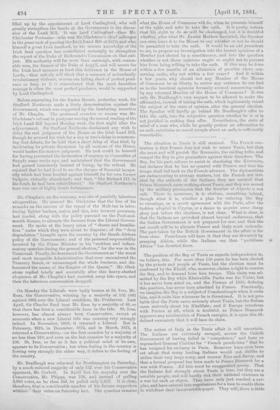Mr. Bradlaugh was returned for Northampton on Saturday, by a
much reduced majority of only 132 over his Conservative opponent, Mr. Corbett, In April last his majority over the Conservative, Mr. Phipps, was 758, and instead of polling 3,980 votes, as he then did, lie polled only 3,437. It is clear, therefore, that a considerable number of his former supporters withhch 'heir votes on Saturday last. The question remains what the House of Commons will do, when lie presents himself at the table, and asks to take the oath. It is pretty certain that his right to do so will be challenged, but it is doubtful whether, after what Mr. Justice Mathew has ruled, the Speaker can even leave it to the House to say whether or not he should be permitted to take the oath. It would be an odd precedent to set, to propose an investigation into the former opinions of a Member just elected by a constituency, and into the question whether or not those opinions ought or ought not to prevent. him from being willing to take the oath. If this may be done within a few months of an admission of peculiar views con- cerning oaths, why not within a few years ? And if within a few years, why should not any Member of the House of Commons be at liberty to revive any evidence he can find as to the heretical opinions formerly avowed concerning oaths by any returned Member of the House of Commons P It was only Mr. Bradlaugh's own request to be allowed to make the affirmation, instead of taking the oath, which legitimately raised the subject of his state of opinion, after the general election. The Speaker will hardly go. behind Mr. Bradlaugh's offer to take the oath, into the subjective question whether he is or is not justified in making that offer. Nevertheless, the state of mind of a man who, while he greatly prefers an affirmation th- an oath, entertains no moral scruple about an oath, is sufficiently remarkable.


































 Previous page
Previous page